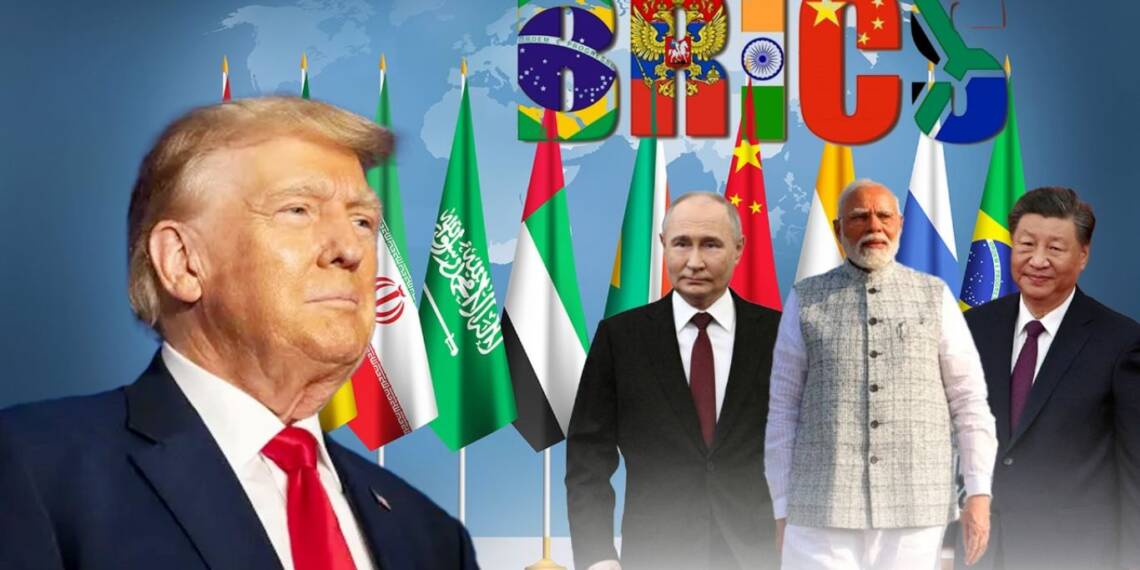US President Donald Trump is already making moves to make dollar great again. After taking office, he announced his plan to impose 100% tariffs on BRICS nations considering dumping dollar.
Unlike Joe Biden and team, Trump sees BRICS as a direct challenge to the dollar’s dominance and believes tariffs, paired with economic incentives, can discourage countries from shifting away from the American-led financial system.
Under Biden, the White House had assessed that BRICS—now comprising Brazil, Russia, India, China, South Africa, Egypt, Ethiopia, Indonesia, Iran, and the UAE—was not a geopolitical threat, given the diverging priorities of its members.
Trump, however, takes the opposite stance, treating tariffs as a tool to pressure nations into alignment with Washington’s interests. Scott Bessent, Trump’s pick for Treasury Secretary, outlined this strategy, comparing it to “escalating to de-escalate.” He suggested tariffs could be imposed with the goal of eventually removing them, similar to how Washington uses sanctions. However, he acknowledged that excessive sanctions risk pushing countries away from the dollar—a lesson learned from the West’s response to Russia’s war in Ukraine.
After Russia launched the invasion of Ukraine, the US and EU froze $300 billion in Russian Central Bank assets. Despite all these efforts by the West to rein in the Russian economy, Vladimir Putin has successfully positioned himself as a defender of the Global South.
He argues that Russia does not exclude countries from its markets, unlike the West, which he accuses of using “neo-colonial” tactics to keep African nations dependent on Western technology and loans. This messaging, echoed by China, has strengthened anti-Western sentiment in many developing countries.
The lesson learnt here was: Don’t shut this US-led financial system for anyone. Let everybody use it.
Now, the Trump administration is working to reinforce the dollar’s global role. Bessent has proposed a tiered system, where countries move from a “green zone” to “yellow” or “red” based on their trade practices.
The American system of tariffs sometimes gives decisive results. For example: When Colombian President Gustavo Petro refused to accept deported migrants from the U.S., Trump imposed a 25% tariff on Colombian goods, set to double the following week. Within hours, Petro reversed his decision and even offered a presidential plane to return migrants. With the U.S. accounting for 34% of Colombia’s trade, he had little choice but to comply.
Trump has used similar tactics with America’s neighbors. Mexican President Claudia Sheinbaum deployed 10,000 National Guard troops to curb drug trafficking and illegal immigration in exchange for a delay in implementing a 25% tariff. Canadian Prime Minister Justin Trudeau also struck a deal, agreeing to tighten border controls against fentanyl smuggling.
Against major rivals like China and Russia, tariffs serve a long-term strategic purpose rather than producing immediate shifts. Bessent argues they can force China to “rebalance” its economy by reducing overproduction and boosting domestic consumption. He also stresses that tariffs should incentivize U.S. manufacturing, creating jobs, shortening supply chains, and lowering costs over time. Trump has already warned global business leaders that they will face tariffs unless they bring production to America.

The Trump administration is largely unified in using tariffs to maintain the dollar’s dominance. The notable exception is Vice President JD Vance, who has questioned whether reserve currency status benefits the U.S., citing the country’s dependence on cheap imports and a weakened industrial base. However, if tariffs successfully boost domestic production and curb de-dollarization, they could address Vance’s concerns.
Still, Washington must be ready for unintended consequences. Tariffs could push BRICS and other nations to develop alternative payment systems, bypassing the dollar entirely. Unlike sanctions, however, tariffs do not directly weaponize the dollar, making them less likely to accelerate de-dollarization.
Economic powerhouses like China, India and Russia are not Canada, Colombia and Mexico. Their combined GDP is almost equal to that of US and they can’t be tamed so easily. US should use incentive-driven system to encourage the world to use dollars. More carrots and less sticks may be the right way to go about it.








